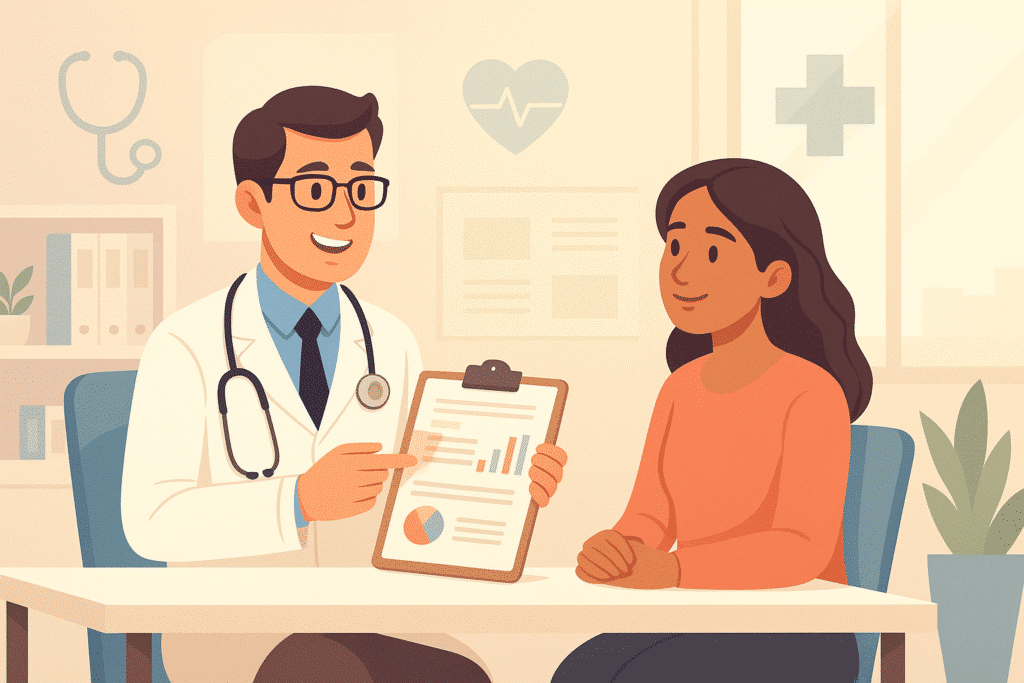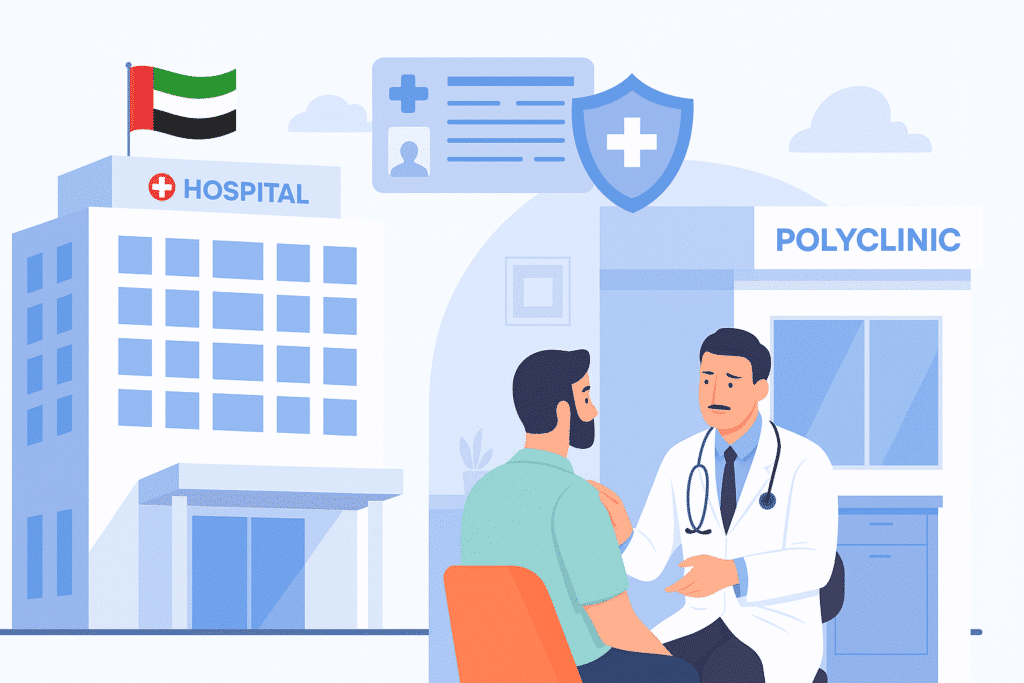
Sexually transmitted diseases (STDs) have been a controversial and very important issue in the whole world, including the United Arab Emirates (UAE). The UAE has harsh guidelines on legal, cultural, and healthcare protocols regarding sexual health matters, and it is imperative to be aware of what to anticipate in the event you or someone you suspect an STD, in the case of personal residency or as a tourist in the country. This blog gives information on Chapter 3: What Will Happen If You Have an STD in the UAE, which is an insightful guide to healthcare, legal implications, prevention, etc
Understanding STDs in the UAE
Diseases, which can be sexually transmitted (STIs), otherwise referred to as sexually transmitted diseases, can trigger serious health problems when they are not addressed. The UAE has a sufficient healthcare system that can manage such cases by prioritizing confidentiality, medical procedures, and the current law.
1. Confidentiality: Protecting Your Privacy
- Confidentiality of the Patient is a Priority: Confidentiality of a patient is one of the most important features of healthcare in the UAE. When choosing to visit a hospital or clinic to get STD treatment, the majority of them are keen on the privacy factor about medical information.
- Reporting of Specific STDs: Whereas most STDs are managed without disclosure, some of the severe diseases, such as HIV/AIDS, are reportable medical conditions to the health authorities. It implies that health care workers must report to the authorities due to the need in the field of health. Nevertheless, your personal information can be covered by healthcare legislation.
- Public Health Concerns: The UAE has potent mechanisms for containing the spread of infectious diseases, and this is reflected in how it handles the cases of STDs. The government tries to find a balance between patients’ privacy and the safety of the rest of the population.
2. Medical Treatment: What to Do If You Suspect an STD
- Prompt treatment: CHAT. It is vital to get medical treatment immediately if you think you may be infected with a sexually transmitted disease. The symptoms should not be disregarded, or the treatment should not be postponed, since it can lead to additional problems and even infect other individuals.
- Where to Go: A majority of all UAE hospitals and clinics, both government and privately owned, provide STD testing and treatment. Also, there are sexual health/reproductive sexual clinics that are specialised in only reproductive sexual health problems, such as STDs.
- Treatment: There are treatments available depending on the STD diagnosed. Caused by bacteria, bacterial diseases (chlamydia or gonorrhea) can often be treated with the help of antibiotics. Viral diseases such as AIDS or herpes have to be treated over a prolonged period.
3. Legal Implications: Understanding the Laws Surrounding STDs
- Laws About Severe STDs: In the UAE, possession of some STDs, particularly HIV/AIDs, has legal connotations. As an example, illegal immigrants observed to have HIV/AIDS can be deported, according to the immigration regulations in the UAE. As part of the issuance of a work visa, expatriates are usually subjected to a medical check-up, and failure to test negative on serious STDs may lead to a visa rejection or confiscation.
- Talking to Legal Experts: When you are diagnosed with a serious STD that could bring legal implications, it is prudent to consult legal experts. You have to make sure that you know all the consequences connected to your residency, employment, and rights in the country.
- Social and Cultural Considerations: Cultural considerations on sexual health in the UAE should be observed, besides the legal elements. Sex should also be discussed openly, but this is less observed in the sexual health context; therefore, discretion should always be observed.
What to Expect When Seeking Treatment

By telling you what to anticipate when you go to a healthcare provider for STD concerns in the UAE, this will aid in preparing you and feel more relaxed. So, this is more of what the general process looks like:
1. Confidential Consultation: Private and Professional
- Initial Consultation: During your initial consultation, your healthcare provider will address the issue, beginning with a confidential consultation, where he or she will ask you about your medical history and what symptoms are causing you issues. Worry not, as such discussions take place in a discrete place.
- Concerns of Sex Life: You need to be ready to respond to queries concerning your sexual activity because, based on the answers, it can determine the risks you face and the required tests recommended.
2. STD Testing: What to Expect
- Testing procedures: In line with your symptoms and sexual activity, you may undergo a series of tests, which may include:
- Blood Tests: To determine the presence of infection, such as HIV or syphilis.
- Urine Tests: May be used to diagnose an infection such as chlamydia or gonorrhea.
- Physical examinations: To indicate genital warts, sores, or other visible symptoms.
- Waiting to get results can also take different times. As an example, certain clinics provide a speedy HIV test, but others might require a few days.
3. Diagnosis and Treatment: Moving Forward After Results
- Positive Diagnosis: In the event you have a positive result on testing that you do have a STD, the healthcare provider will explain treatment to you. Depending on the disease, treatment can include:
- Medications: Bacterial and viral STDs are usually treated with antibiotics or antiviral drugs.
- Change of lifestyle: Avoiding sex in the course of treatment or putting on condoms to avoid further transmission of the disease.
- Follow-Up Visits: Certain STDs will need follow-up visits, so the treatment can be determined to be effective, and you are not at risk of a reinfection. Your physician will instruct you on the effective care practices to be followed.
Important Considerations for Managing STDs
Dealing with an STD does not only entail treatment, but it also involves ensuring that it does not get transferred and ensuring that your general well-being is intact. The following is what to keep in mind:
1. Prevention: Protecting Yourself and Others
- Condoms: Practicing proper and regular use of condoms is one of the best measures that help prevent STDs. Condom use is important whether you are in a long-term relationship or have any casual encounter.
- Get Vaccinated: Certain STDs, such as HPV, have vaccinations. Vaccination can also protect you more against some kinds of STDs, particularly in case you are entitled to this protection.
2. Informing Partners: Open Communication is Key
- Inform Your Sexual Partners: One of the crucial things you should do when you are diagnosed with an STD is to inform your past or present sexual partners so they can be tested and allow curing in case they are infected. This can assist in the prevention of infections spread to others.
- Partner Notification Services: Other health facilities in the UAE also provide partner notification services; healthcare providers will provide notification of your partner(s) anonymously on your behalf.
3. Ongoing Care: Some STDs Require Long-Term Management
- Frequent Check-ups: Frequent check-ups might be required even after the first medical care in some cases of STDs. Severity such as HIV, herpes, or HPV may necessitate situational supervision and therapy.
- Symptom Management: Symptoms can be treated with a proper treatment plan; some STDs, particularly virally infected ones, might not be curable, but symptoms can be curbed. You should communicate with your doctor regularly; thus, you will remain healthy and avoid complications to the utmost.
Seeking Help in the UAE: Where to Go for STD Care

Suppose you have an infection or think you are engaging in risky sexual behaviours: In the UAE, where can you get help to answer these questions?
1. Hospitals and Clinics: Confidential STD Testing and Treatment
- Public and Private Facilities: There are various privately owned and publicly owned healthcare facilities in the UAE where STD testing and treatment can be administered. These are large hospitals, independent clinics, and specialized sexual clinics.
- Healthcare Costs: Social healthcare is often cheaper, however, the wait time in such institutions is long along with the level of confidentiality that is also low; but they are comparatively cheap, and the level of confidentiality is low. You should also be sure of your health insurance coverage because not every insurance plan covers the treatment of STDs.
2. Government Health Agencies: Trusted Information and Resources
- Web-based health portals: Government health portals, e.g., Dubai Health Authority (DHA) or Ministry of Health and Prevention, can present important information about sexual health and prevention, and other ways to implement STD care delivery.
- Educational Campaigns: The UAE conducts occasional awareness programs on prevention and sexual health of STDs and provides current information on safe practices and health services.
Read Also: Crack the FAB Car Loan Code: Your Ultimate Guide
Final Thoughts
The issue of having an STD in the UAE may seem threatening; however, one should keep in mind that healthcare assistance is offered to people, and the medical system is capable of providing the required therapy and care. Secrecy, appropriate medical care, and conformance to legal requirements of the country a fundamental benefits or investments in your sexual health.
In brief, when you have some doubts about having an STD:
- Get some medical help.
- Know your rights and privacy in health.
- Be sensitive to the legal consequences.
- Act to stop any further transmissions.
- Follow up with treatment and follow up.
Sexual well-being is your healthy sex life. And do not be afraid to turn to healthcare professionals in the UAE in case you need them, but make sure that you will stay safe and help others to stay safe as well.

